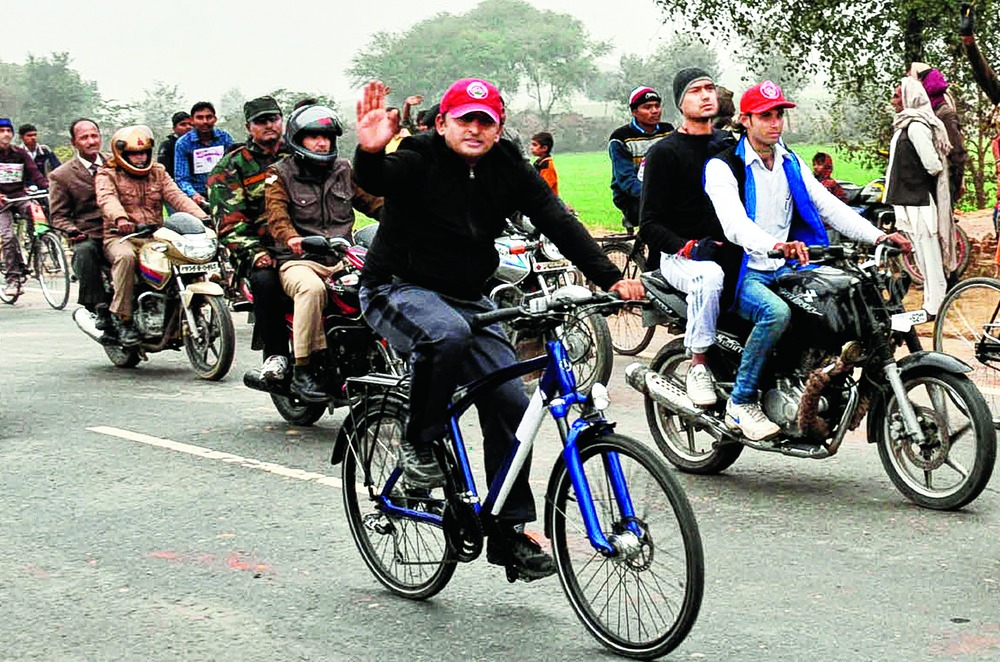
New Delhi, Jan. 16: The Election Commission today handed Akhilesh Yadav's faction the "cycle" as its poll symbol, acknowledging its claim to being the real Samajwadi Party and providing a fillip to alliance talks with the Congress.
The commission went by the test of majority, concluding that the chief minister enjoyed far greater support within the party than his father Mulayam Singh Yadav.
It did not prioritise the question whether the disputed January 1 "national convention" that had replaced Mulayam with Akhilesh as party head had been convened and conducted according to the party constitution.
The commission cited precedents, particularly the 1969 split in the Congress and a subsequent Supreme Court order sanctifying the majority test as the sole principle in deciding such intra-party disputes.
Delighted Congress seniors confirmed an impending alliance with the Samajwadis, now that Akhilesh had emerged as the party's indisputable leader, for the February-March Uttar Pradesh elections.
Sources suggested an alliance could be announced as early as tomorrow, with both sides having broadly worked out the seat shares, although the possibility remains of friendly fights in a few constituencies.
A few disgruntled BJP members and friends too are believed to be in touch with Akhilesh and the Congress, among them the new entrant Swamy Prasad Maurya and ally Om Prakash Rajbhar.
Maurya had quit the Bahujan Samaj Party to join the BJP last year, while Rajbhar's Suheldev Bhartiya Samaj Party was eyeing an alliance with the BJP. Both are unhappy about the number of seats offered to their supporters.
Although the Congress and the Akhilesh camp were preparing to contest the polls together, they were jittery about the chief minister being denied the long-time Samajwadi election symbol for which he was competing with Mulayam.
That would have left Akhilesh with little time to popularise a new symbol, hurting his prospects. This evening, sources in both parties sounded immensely hopeful about the impact of a Rahul Gandhi-Akhilesh tango.
The commission's order said the Mulayam camp had offered no substantive argument apart from stressing that Akhilesh's chief adviser Ram Gopal Yadav, who had called the January 1 meeting, had already been suspended from the party and therefore the convention was unconstitutional.
The commission said that Mulayam had shown no interest in challenging Akhilesh's claim to majority support within the party.
"The Akhilesh group claimed support of (i) 31 members of the national executive out of 47 (ii) 195 MLAs out of 229 (iii) 48 out of the 68 members of the legislative council (iv) 4 out of 5 Lok Sabha members (v) 11 out of 19 Rajya Sabha members and (vi) 5,242 delegates," it said.
"List of the aforesaid members along with their signatures, of their having attended that convention and supported the resolution, was also submitted."
It added: "On the other hand, Mulayam Singh Yadav did not file any affidavit (except his own); nor did he make claim of any support among the aforesaid category of members for his group, in spite of the fact that he had been specifically directed to file all such affidavits in support of his claim."
According to the order, Akhilesh's lawyer Kapil Sibal wanted the commission to apply the majority test while Mohan Parasaran, representing Mulayam, stressed "the touchstone of (the rival factions') functioning as per the 29 provisions of the party constitution".
"The commission is fortified by the observations and ruling of the Supreme Court in the case of Sadiq Ali. The Supreme Court, upholding the test of majority applied by the commission in the matter of dispute in the Indian National Congress in 1969 by its order dated January 11, 1971, observed that: 'It is, in our opinion, not necessary for this court to express any opinion. Likewise it is not essential to say anything as to whether one or both the groups were in the wrong and if so, to what extent in the controversy relating to the split in the Congress'," the commission said.
"The Supreme Court said - All that this court is concerned with is whether the test of majority or numerical strength which has been taken into account by the commission is in the circumstances of the case a relevant and germane test.
"In the same judgment, the apex court also observed that numbers have a relevance and importance in a democratic system of government or political set-up and it is neither possible nor permissible to lose sight of them. Indeed, it is the view of the majority which in the final analysis proves decisive in a democratic set-up."

